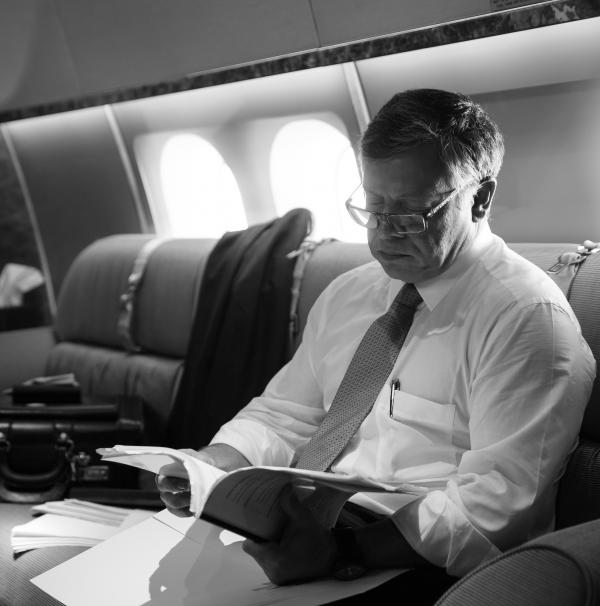The road from here

From time to time, history holds moments of great potential, when we can look forward with hope even as we experience crisis and uncertainty. In the Arab-Israeli conflict, just such a moment may be here. With the sad passing of Yasser Arafat, Palestinians have lost a leader who kept their hope of independence alive for more than half a century. Now, an opportunity exists to honour the best of that legacy, in a new drive for progress and peace, in a part of the world that has seen too much bloodshed.
Today the Arab-Israeli conflict remains the world's central challenge. Israelis and Palestinians both need an end to its bitter violence. So do the global millions who suffer the collateral damage: ongoing extremist violence and deep cynicism about international justice.
In 2002, Arab countries took a bold step forward, committing themselves to a two-state solution that includes security guarantees for Israel to live in peace with its neighbours; a sovereign and democratic Palestine; and a process that leads to a comprehensive settlement, addressing the Syrian and Lebanese tracks.
The two-state solution recognises what I and my late father, King Hussein, have long argued. For lasting peace, Israel must be fully integrated into the entire region, from Morocco to Yemen. But this depends on creating an independent Palestinian state, whose people are, at last, able to live in dignity and hope. Unless this happens, there will be no region-wide acceptance of Israel and no real peace.
In 2003, the parties agreed on the roadmap to peace. The United States and the eight leading industrialised nations are also on board. But the process has been trapped in an ongoing cycle of violence. Now, events provide fresh opportunities. New Palestinian leadership can carry forward the vision of a viable, independent Palestine by delivering on the reforms that statehood involves: competent governance, investments in public welfare, fighting corruption, tougher security against terrorism and a real partnership at the peace tables.
In Israel, the government can recommit to the roadmap and move swiftly to withdraw from Gaza and take other confidence-building measures that will refute the charge that its recent policies are intended to sideline the peace process and further divide people. Both sides can now make the compromises that a comprehensive, lasting and just peace requires.
Just as important, with its elections over, the United States can now refocus on this critical issue. The world's most powerful, most visible democracy has a chance to send a strong message to the region's people, especially its youth – a message of deeds, not words. That means fulfilling the promise of a rebuilt, violence-free, democratic and sovereign Iraq. And in the spiritual heart of the region it means leading the peace process and insisting that both sides engage in genuine dialogue and live up to their commitments spelled out in the roadmap – one that President Bush has said could lead to the creation of a Palestinian state next year.
Americans know how important it is to reach the world's Muslims. In the aftermath of 9/11, American leaders pledged that the war on terror was not a war on Islam. They acknowledged Islam's commitment to peace and recognised the great contributions of the world's 1.2 billion Muslims. They called on people of all faiths to stand together, and called on all nations to join the United States in its fight.
And for good reason. We can't win the war on terror if we don't act together. We Muslims were the first targets of the extremists, whose stated goal is to bring down moderate governments and stop the growth of democratic civil society. My country has played a significant role in the global alliance against terrorism, and more: we have led a regional effort for reform and development to counter the voices of hatred and cynicism. International reports have ranked our country first in the region in educational reform. In the economy, we have encouraged growth and opportunity; in public life, we have emphasised human rights and good governance.
My country's vision is of a modern civil society rooted in Arab-Islamic values. The Quran teaches: “Be just: that is next to piety.” As a descendant of the Prophet Mohammad, peace be unto Him, I am committed to the struggle for tolerance and progress. I believe Jordan's path shows what a home-grown Arab-Islamic model can accomplish in fostering development, combating extremism and providing new hope.
At the end of the day, the success of regional reform depends on a renewed commitment to peace and progress, supported by a courageous America. That achievement will bring global healing. Perhaps now, in a moment shaped by both loss and hope, the time has come.


